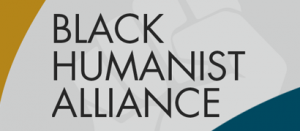Humanism Goes Hand-in-Hand with Racial Justice and #BlackLivesMatter

In theory, humanism is inclusive. A fundamental principle in humanism is that every human being should be protected and treated equally. This intrinsic value of humanism is at the core of all social justice movements.
Unfortunately, concept and intent are tainted by our perceptions, which are shaped by our positions within society. These positions allow us to recognize, appreciate, and comprehend some social dynamics while obscuring our understanding of or connection to other social realities either partially or entirely. And humanists can’t continue saying we’re about human progress when we neglect issues that adversely affect human rights and social parity on an everyday basis.
We live in a country where Black lives—from that of Barack Obama to Eric Garner to Renisha McBride and Marissa Alexander—are actively devalued.
We live in a country where markers of progress are often used to minimize or dismiss systemic social inequality. People cite the death of DOMA and nationwide marriage equality for LGBT communities as “proof” that our society has reached a pinnacle of acceptance and fairness. But continued high rates of homelessness, violence, health and economic injustice stats reveal that queer people remain marginalized in various ways.
Likewise, many cite select cases of Black achievement like that of President Obama and Oprah Winfrey to show “how far we’ve come” as a nation—a fallacious tendency to prop up exemplars to declare racism is an obsolete or benign disease that no longer inflicts the US in any significant way.
Whether we like to admit it or not, these cultural beliefs also thrive within humanist and atheist spaces. Consequently, groups and organizations that emphasize the Black identity are questioned and even criticized.
But secular communities need to better combat social inequality on a more broad scale. As noted by academic and writer Sikivu Hutchinson, “Progressive atheist, humanist, and secular organizations need to proactively and visibly mobilize around issues that go far beyond the usual church/state separation and ‘science and reason’ agenda.”
Occasionally spotlighting minority representation as if we’re a refreshing but brief departure from the “normal” state of affairs isn’t good enough. Lip service won’t do. Relying on rare appearances or a single representative of a given group is tokenism, not actual diversity. If we’re to be about development and growth, then it behooves us to be more than words and superficial allegiance.
The American Humanist Association recognizes the need to counter common but false narratives and is launching, in coming weeks, a group that operates at the intersection of humanist thought and social justice activism: the Black Humanist Alliance.
Using humanism as a life praxis, the Black Humanist Alliance seeks to realize the need for a more intersectional and more politicized scope of activism through encouraging social justice competency within secular spaces as well as by engaging in racial, gender, and restorative justice activism.
This alliance, like other identity-based groups, isn’t intended to be a space for gratuitous special attention. This initiative was conceived because issues that uniquely impact Black lives simply aren’t adequately addressed by most mainstream platforms.
“As long as racism remains prevalent and systemic, there will always be a need for Black groups,” says Xandelyn Wright, co-chair of the Black Humanist Alliance’s advisory council.
While the Black Humanist Alliance concerns itself with confronting expressions of religious hegemony in public policy, we are also devoted to confronting social, economic, and political deprivations that disproportionately impact Black America due to centuries of culturally ingrained prejudices.
Without the subtext of a higher power, we focus on instruction, problem-solving, community building, and direct action in recognition that issues surrounding systems of oppression are intertwined. To actively challenge social inequality, it’s imperative our critical thinking tools aren’t limited only to scrutinizing hocus pocus and god beliefs.
Anthony Pinn, professor at Rice University and board member of both the American Humanist Association and the Black Humanist Alliance, sums up this humanistic desire by saying, “We must do more—or stop talking about fostering a more reasonable society.”
Stay tuned for the official launch of the American Humanist Association’s social justice alliances on May 18.
